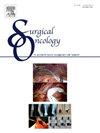外耳局部晚期皮肤癌的手术与免疫治疗:一项多中心研究
IF 2.4
4区 医学
Q3 ONCOLOGY
引用次数: 0
摘要
背景/目的免疫治疗是局部晚期和晚期皮肤癌的一种很有前景的治疗策略。本研究的目的是比较手术治疗和头孢米单抗治疗患者的生存结果。其次,我们评估了辅助治疗、肿瘤分期和边缘状态如何影响手术组的肿瘤预后。方法本研究纳入了2015年至2023年间接受手术治疗的77例局部晚期外耳皮肤癌患者,这些患者要么接受辅助治疗,要么不接受辅助治疗,要么接受西米单抗治疗。结果与接受手术治疗的患者相比,免疫疗法在24个月(HR = 0.09, p = 0.02)和60个月(HR = 0.11, p = 0.04)时的疾病特异性生存率均有改善,估计5年生存率分别为80%和55.9% (log-rank = 0.03)。相反,手术比单抗更有利于无病生存(HR 0.58, p = 0.08),中位生存期分别为25.6个月和14.2个月。与III期相比,IV期在按治疗策略分层时往往具有更差的生存率。辅助治疗的增加将IV期的中位疾病特异性生存期从12个月提高到40个月。另一方面,辅助放疗对切缘状况分层的结果没有显著影响,特别是当切除边缘清晰时(p = 0.36)。结论外耳皮肤癌是一种罕见的肿瘤,多发于老年患者,且并发症发生率高。新兴的治疗策略可以作为手术的替代方案,为这些肿瘤的治疗算法的未来调整提供了基础。本文章由计算机程序翻译,如有差异,请以英文原文为准。
Surgery versus immunotherapy in locally advanced cutaneous carcinoma of the external ear: A multicenter study
Background/objectives
Immunotherapy is a promising therapeutic strategy for cutaneous carcinoma in locally advanced and advanced stages. This study aims to compare the survival outcomes between patients treated with surgery and those treated with cemiplimab. Secondly, we evaluated how adjuvant treatment, tumor stage, and margins status may influence the oncological outcomes in the surgical group.
Methods
The study included 77 patients with locally advanced cutaneous carcinoma of the external ear treated between 2015 and 2023 with surgery, either followed or not by adjuvant therapy, or treated with cemiplimab.
Results
Immunotherapy demonstrated a benefit in the disease-specific survival both at 24 months (HR = 0.09, p = 0.02) and at 60 months (HR = 0.11, p = 0.04) when compared to patients treated by surgery, with an estimated 5-year survival of 80 % and 55.9 %, respectively (log-rank = 0.03). Conversely, surgery showed a more favorable trend for disease-free survival than cemiplimab (HR 0.58, p = 0.08), with a median survival of 25.6 and 14.2 months. Stage IV, compared to stage III, tended to have a worse survival rate when stratified by treatment strategy. The addition of adjuvant therapy improved median disease-specific survival from 12 to 40 months for stage IV. On the other hand, adjuvant radiotherapy did not significantly affect outcomes when stratified by margin status, especially when resection margins were clear (p = 0.36).
Conclusions
Cutaneous carcinoma of the external ear represents a rare entity, affecting elderly patients and still associated with high complication rates. Emerging therapeutic strategies, which may serve as alternatives to surgery, offer a basis for future adjustments of treatment algorithms for these neoplasms.
求助全文
通过发布文献求助,成功后即可免费获取论文全文。
去求助
来源期刊

Surgical Oncology-Oxford
医学-外科
CiteScore
4.50
自引率
0.00%
发文量
169
审稿时长
38 days
期刊介绍:
Surgical Oncology is a peer reviewed journal publishing review articles that contribute to the advancement of knowledge in surgical oncology and related fields of interest. Articles represent a spectrum of current technology in oncology research as well as those concerning clinical trials, surgical technique, methods of investigation and patient evaluation. Surgical Oncology publishes comprehensive Reviews that examine individual topics in considerable detail, in addition to editorials and commentaries which focus on selected papers. The journal also publishes special issues which explore topics of interest to surgical oncologists in great detail - outlining recent advancements and providing readers with the most up to date information.
 求助内容:
求助内容: 应助结果提醒方式:
应助结果提醒方式:


